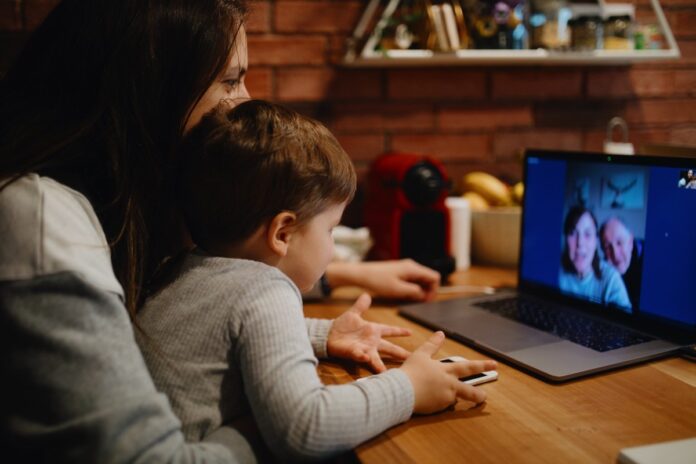
As families continue to practice social distancing during the coronavirus pandemic and many parents remain at home with their young children, it’s important to monitor the amount of time young children spend in front of a screen.
“Families should recognize that this is a unique time in everybody’s lives,” said First Things First’s Senior Director of Family Support, Katherine Willard. “While access to technology has been a resource during COVID-19, it’s important to remember that the best way children learn is through interactions with a trusted caregiver.”
First Things First (FTF), Arizona’s early childhood agency, knows that now, many families do not have the option to shield their child from a screen at all times. Instead, parents can follow some simple guidelines to manage screen time for their young kids.
The American Academy of Pediatrics (AAP) recommends no exposure to screens for children 18 months old and younger. The exception is using live video chat so that children can connect with family and friends who are far away or who can’t visit in-person because of social distancing. As the child gets older, families can use technology and interactive media to strengthen relationships.
The recommendations say that between 18 months and 2 years old, you should limit the watching to educational programming with a caregiver. For example, if you’re watching Sesame Street and Elmo is doing the happy dance, encourage your child to dance along. Find ways to interact with your child, based on what he is watching.
For children between ages 2-5, high-quality educational content is recommended for a limit of about an hour a day, the AAP says. Make sure that whatever your child is watching, that it is age appropriate. Even Disney movies, like The Lion King are not appropriate for young children. One of Willard’s recommendations is the Arizona PBS app, which gives age ranges for their shows for young kids.
Ultimately, parents of toddlers and preschoolers should give themselves a break while trying to balance working from home and caring for young children, Willard said.
“Instead of focusing on what you can’t do, focus on what you can do with your child after your work day is over,” she said. Willard said she knows that sometimes the only option is to offer an educational video, if parents have a video meeting or phone call that they must attend to, but make a plan for positive interactions later in the day.
“Have them help you set the table or cook a meal,” she said.
Turn off the television or computer, which is sometimes used as background noise, during dinner time.
“Talk about your day. You have another opportunity for that back and forth conversation during mealtime,” Willard said.
As noted earlier, the one exception to screen time limits is live video chat, like FaceTime, Zoom and Skype, among others, which allow the kind of responsive interactions that are good for helping babies and toddlers develop language. When the baby communicates through nods, gestures or expressions, they are able to see that the person on the other end respond to them.
“On FaceTime, kids can have time with grandparents, who can play peek-a-boo, or sing songs, or even read a book to them,” Willard said. “It’s the personal connection that is really helping brain development. And it’s so important to maintain that social connection during this time.”
First Things First is a voter-created, statewide organization that funds early learning, family support and children’s preventive health services to help kids be successful once they enter kindergarten. Decisions about how those funds are spent are made by local councils staffed by community volunteers. To learn more, visit FirstThingsFirst.org.

![Who’s the Best Mom InMaricopa? Nominate now! Marlene Marshall, Christina Olivares, and Meghan Bremer. [Bryan Mordt]](https://www.inmaricopa.com/wp-content/uploads/2023/05/BCM_8465-218x150.jpg)







![Maricopa sheds tears amid Maui wildfires that killed dozens For Maricopa resident Janelle Gomez, the sorrow mirrors the loss of a family member. [Brian Petersheim]](https://www.inmaricopa.com/wp-content/uploads/2023/08/Gomez-218x150.jpg)


![Alleged car thief released without charges Phoenix police stop a stolen vehicle on April 20, 2024. [Facebook]](https://www.inmaricopa.com/wp-content/uploads/2024/04/IMG_5040-218x150.jpg)




